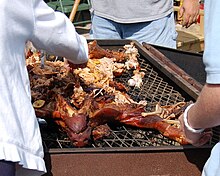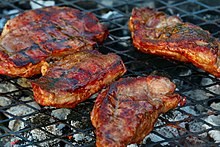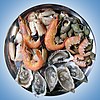Барбекю

Барбекю или барбекю (часто сокращается до барбекю по всему миру; Барби или Барби в Австралии и Новой Зеландии) - это термин, используемый со значительными региональными и национальными вариациями для описания различных методов приготовления пищи , которые используют живой огонь и дым для приготовления пищи. [ 1 ] Термин также обычно применяется к устройствам, связанным с этими методами, более широкой кухни , которые производят эти методы, и пищи или собрания, при которых этот стиль еды готовится и подают. Методы приготовления, связанные с барбекю, значительно варьируются, но большинство связаны с приготовлением пищи на открытом воздухе и в помещении.
Различные региональные вариации барбекю могут быть в целом классифицированы в тех методах, которые используют прямые, и те, которые используют косвенное нагрев. [ 1 ] Косвенные барбекю связаны с североамериканской кухней, в которой мясо нагревается жаркой или курением над древесиной или углем . [ 2 ] Эти методы барбекю включают приготовление пищи с использованием дыма при низких температурах и длительном времени приготовления в течение нескольких часов. В другом месте, на барбекю чаще относится к более прямому применению тепла, жарке пищи над горячими углями или газовым огнем. [ 1 ] Эта техника обычно выполняется по прямой, сухой жаре или горячим огнем в течение нескольких минут. В рамках этих более широких категоризации являются дальнейшие национальные и региональные различия. [ 2 ]
Этимология и правописание
[ редактировать ]
Английское слово барбекю и его родственники на других языках поступают из испанского слова Barbacoa , которое имеет свое начало в коренном американском слова. [ 3 ] Этимологи считают, что это будет получено из Барабику , найденного на языке народа Аравака Карибского бассейна и Тимокуа народа во Флориде ; [ 4 ] Он вошел в некоторые европейские языки в форме Барбакоа . Оксфордский английский словарь (OED) прослеживает слово в латинолу и переводит его как «структуру палочек, установленных на посты». [ 5 ]
Популярная народная этимология слова говорит, что этот термин получен из французского очереди барбе («от бороды до хвоста»), обозначающего целое животное, жареные на косе, но это происхождение для слова не поддерживается академической этимологией. [ 6 ]
Сам термин имеет два написания на английском языке: «барбекю» и «барбекю». В то время как в большинстве стран используется орфография «барбекю», орфография «барбекю» иногда используется в Австралии , Новой Зеландии , [ 7 ] и США.
History
[ редактировать ]Spanish explorer Gonzalo Fernández De Oviedo y Valdés was the first to use the word barbecoa in print in Spain in 1526 in the Diccionario de la Lengua Española (2nd Edition) of the Real Academia Española. After Columbus landed in the Americas in 1492, the Spaniards apparently found Taíno roasting meat over a grill consisting of a wooden framework resting on sticks above a fire. This framework was also used to store food above ground and for sleeping. The flames and smoke rose and enveloped the meat, giving it a certain flavor.[8] Spaniards called the framework a barbacoa.
Another form of barbacoa involves digging a hole in the ground, burning logs in it and placing stones in it to absorb and retain heat. Large cuts of meat, often wrapped in leaves, often a whole goat or lamb, are placed above a pot so the juices can be used to make a broth. It is then covered with maguey leaves and coal, and set alight. The cooking process takes a few hours. Olaudah Equiano, an African abolitionist, described this method of roasting alligators among the "Mosquito people" (Miskito people) on his journeys to Cabo Gracias a Dios on the Mosquito Coast, in his narrative The Interesting Narrative of the Life of Olaudah Equiano.[9]
Linguists have suggested the word was loaned successively into Spanish, then Portuguese, French, and English. In the form barbacado, the word was used in English in 1648 by the supposed Beauchamp Plantagenet in the tract A description of the province of New Albion: "the Indians in stead of salt doe barbecado or dry and smoak fish".[10]
According to the Oxford English Dictionary, the first recorded use in modern form was in 1661, in Edmund Hickeringill's Jamaica Viewed: "Some are slain, And their flesh forthwith Barbacu'd and eat";[5] it also appears in 1672 in the writings of John Lederer following his travels in the North American southeast in 1669–1670.[11]
The first known use as a noun was in 1697 by the English buccaneer William Dampier. In his New Voyage Round the World, Dampier wrote, "and lay there all night, upon our Borbecu's, or frames of Sticks, raised about 3 foot [0.91 m] from the Ground".[12]
As early as the 1730s, New England Puritans were familiar with barbecue, as on 4 November 1731, New London, Connecticut, resident Joshua Hempstead wrote in his diary: "I was at Madm Winthrops at an Entertainment, or Treat of Colln [Colonel] or Samll Brownes a Barbaqued."[13] Samuel Johnson's 1755 dictionary gave the following definitions:[14]
- "To Barbecue – a term for dressing a whole hog" (attestation to Pope)
- "Barbecue – a hog dressed whole"
While the standard modern English spelling of the word is barbecue, variations including barbeque and truncations such as bar-b-q or BBQ may also be found.[15] The spelling barbeque is given in Merriam-Webster as a variant, whereas the Oxford Dictionaries explain that it is a misspelling which is not accepted in standard English and is best avoided.[16][17] In the Southeastern United States, the word barbecue is used predominantly as a noun referring to roast pork, while in the Southwestern states cuts of beef are often cooked.[18]
Associations
[edit]Because the word barbecue came from native groups, Europeans gave it "savage connotations".[19]: 24 This association with barbarians and "savages" is strengthened by Edmund Hickeringill's work Jamaica Viewed: with All the Ports, Harbours, and their Several Soundings, Towns, and Settlements through its descriptions of cannibalism. However, according to Andrew Warnes, there is very little proof that Hickeringill's tale of cannibalism in the Caribbean is even remotely true.[19]: 32 Another notable false depiction of cannibalistic barbecues appears in Theodor de Bry's Great Voyages, which in Warnes's eyes, "present smoke cookery as a custom quintessential to an underlying savagery [...] that everywhere contains within it a potential for cannibalistic violence".[19]: 36 Today, people in the US associate barbecue with "classic Americana".[19]: 3
Styles
[edit]

In American English usage, grilling refers to a fast process over high heat while barbecuing usually refers to a slow process using indirect heat or hot smoke, similar to some forms of roasting. In a typical US home grill, food is cooked on a grate directly over hot charcoal, while in a US barbecue the coals are dispersed to the sides or at a significant distance from the grate. In British usage, barbequeing refers to a fast cooking process done directly over high heat, while grilling refers to cooking under a source of direct, moderate-to-high heat—known in the United States as broiling. Its South American versions are the southern Brazilian churrasco and the Uruguayan/Argentine asado.[20]


For barbecue in the United States, each Southern locale has its own variety of barbecue, particularly sauces. In recent years, the regional variations have blurred as restaurants and consumers experiment and adapt the styles of other regions. South Carolina is the only state that traditionally features all four recognized barbecue sauces, including mustard-based, vinegar-based, and light and heavy tomato-based sauces. North Carolina sauces vary by region; eastern North Carolina uses a vinegar-based sauce, the center of the state uses Lexington-style barbecue, with a combination of ketchup and vinegar as its base, and western North Carolina uses a heavier ketchup base. Memphis barbecue is best known for tomato- and vinegar-based sauces. In some Memphis establishments and in Kentucky, meat is rubbed with dry seasoning (dry rubs) and smoked over hickory wood without sauce. The finished barbecue is then served with barbecue sauce on the side.[21]
In South Africa, braais are informal gatherings of people who convene around an open fire for any occasion and at any location with a grill. They are linked to the consistent warm weather of South Africa that leads to much communal, outdoor activity.[22] The act of convening around a grill is reminiscent of past generations gathering around open fires after a hunt, solidifying the braais' importance to tradition.[23] Modernity has expanded grilling to the use of gas grills, but steel grill grates and campfires are often used.[23] The use of a gas grill is frowned upon and the use of charcoal is accepted, but wood is seen as the best method to cook the meat.[24]
It is expected that people attending a braai bring snacks, drinks, and other meat to eat until the main meal has finished cooking on the grill. This potluck-like activity is known as "bring and braai".[25] Cooking on the braai is a bonding experience for fathers and sons, while women prepare salads and other side dishes in kitchens or other areas away from the grill.[26] Examples of meat prepared for a braai are lamb, steaks, spare ribs, sausages, chicken, and fish.[22] Mielie pap, also known as "Krummel pap", is a crumbled cornmeal that is often served as a side dish.[27][22]
Techniques
[edit]
Barbecuing encompasses multiple types of cooking techniques. The original technique is cooking using smoke at low temperatures—usually around 116–138 °C (240–280 °F)—and significantly longer cooking times (several hours), known as smoking.

Grilling is done over direct, dry heat, usually over a hot fire over 260 °C (500 °F) for a few minutes. Grilling and smoking are done with wood, charcoal, gas, electricity, or pellets. The time difference between smoking and grilling is because of the temperature difference; at low temperatures used for smoking, meat takes several hours to reach the desired internal temperature.[28][29]
Smoking
[edit]Smoking is the process of flavoring, cooking, and/or preserving food by exposing it to smoke from burning or smoldering material, most often wood. Meat and fish are the most common smoked foods, though cheeses, vegetables, nuts, and ingredients used to make beverages such as beer or smoked beer are also smoked.[30][31]
Grilling
[edit]
Grilling is a form of cooking that involves a dry heat applied to the food, either from above or below. Grilling is an effective technique in order to cook meat or vegetables quickly since it involves a significant amount of direct, radiant heat. Outside of the US, this is the most common technique when cooking classic barbecue foods, although some variants of grilling require direct, but moderate heat.[32]
The words "barbecue" and "grilling" are often used interchangeably, although some argue that barbecue is a type of grilling, and that grilling involves the use of a higher level of heat to sear the food, while barbecuing is a slower process over a low heat.[33][34]
In practice, the lines blur because it is hard to define what is low temperature and what is high temperature and because many champion barbecue cooks now cook meats such as beef brisket at higher temperatures than was traditional.
Other uses
[edit]The term barbecue is also used to designate a flavor added to food items, the most prominent of which are potato chips.[35]
See also
[edit]- List of barbecue dishes – Distinct food types generally cooked using the specific method
- List of barbecue restaurants
- List of smoked foods
- Regional variations of barbecue
- Asado – Meat dish traditional in Uruguay, Argentina, Rio Grande do Sul, Peru, Paraguay and Chile
- Braai, South Africa
- Churrasco – Portuguese and Spanish name for beef or grilled meat
- Korean barbecue – Regional style of food preparation
- Memphis-style barbecue – Regional style of food preparation in the United States
- Mongolian barbecue – Stir-fried dish
- Kansas City-style barbecue – Dish of slowly smoked meat
- Kebab – Variety of meat dishes originating in the Middle East
- Mangal – Middle Eastern barbecue
- Mashawi
- North Carolina barbecue – Regional style of food preparation in the United States
- Satay – Indonesian form of kebab
- Shaokao – Chinese term for barbecue
- Siu mei – Cantonese roasted meat, Cantonese barbecued meat
- Souvla – Cyprus skewered barbecue meat
- St. Louis-style barbecue – Spare ribs dish
- Texas Barbecue – Regional style of food preparation in the United States
- Yakiniku – Korean-style grilled meat cuisine in Japan
- Barrel barbecue – Type of barbecue made from a 55-gallon barrel.
- Buccan – device for grilling
- Burnt ends – Barbecued meat delicacy
- Carne asada – Dish of grilled and sliced beef
- Ribfest – Type of food festival that occurs throughout the United States and Canada
- Shashlik – Form of shish kebab
- Spice rub – Spices rubbed on food before cooking
- Teppanyaki – Style of Japanese cuisine
References
[edit]- ^ Jump up to: a b c Bawdon, Michael. "A guide to different types of barbecue". Great British Chefs. Retrieved 8 April 2021.
- ^ Jump up to: a b Moss, RF (2020). Barbecue: the history of an American institution. University Alabama Press.
- ^ Hakim, Joy (2005). The First Americans: Prehistory - 1600 (3rd ed.). Oxford University Press. p. 121.
- ^ Hale, C. Clark (2000). The Great American Barbecue and Grilling Manual. McComb, MS: Abacus Pub. Co. ISBN 0936171022.[page needed]
- ^ Jump up to: a b "Oxford Dictionary". Old.cbbqa.org. Archived from the original on 21 April 2021. Retrieved 12 December 2015.
- ^ "Barbecue". World Wide Words. Retrieved 11 July 2023.
- ^ "Barbeque or Barbecue in Australia: You're probably right - Z Grills Australia". 25 September 2020.
- ^ Peters, Philip Dickenson (2003). Caribbean Wow 2.0 (1st ed.). Coral Gables, Fla.: House of Zagada. p. 27. ISBN 9781929970049. Retrieved 12 December 2015.
- ^ Equino, Olaudah (2012). The Interesting Narrative of the Life of Olaudah Equiano. Lanham: Start Publishing LLC. p. 316. ISBN 978-1625584717. Retrieved 12 December 2015.
- ^ Plantagenet, Beauchamp (1648). "4". A description of the province of New Albion. Retrieved 15 March 2019.
- ^ Lederer, John (1672). The Discoveries of John Lederer. p. 28. Retrieved 12 December 2015.
- ^ Dampier, William. A New Voyage Round the World. Ripol Classic. p. 20. ISBN 1148385150. Retrieved 12 December 2015.
- ^ Hempstead, Joshua (1901). Diary of Joshua Hempstead of New London, Connecticut. New London County Historical Society. p. 241. ISBN 9780259727545.
- ^ Johnson, Samuel (1756). A dictionary of the English language. Oxford University. p. 70. Retrieved 12 December 2015.
- ^ "southern barbecue BBQ culture and foodways". storySouth. 5 April 2002. Archived from the original on 11 September 2012. Retrieved 6 September 2012.
- ^ "Barbeque". Free Merriam-Webster Dictionary. Retrieved 6 September 2012.
- ^ "Definition of barbecue". Oxford Dictionaries (British & World English). 24 June 2013. Archived from the original on 6 November 2010. Retrieved 24 June 2013.
- ^ "America searches for the perfect barbecue". Newsweek. 103 (19–26). May 1984. Retrieved 12 December 2015.[page needed]
- ^ Jump up to: a b c d Warnes, Andrew (2008). Savage Barbecue: Race, Culture, and the Invention of America's First Food. University of Georgia Press. ISBN 9780820328966.
- ^ Matthew Bell (18 July 2013). "Gaucho grill: How to cook the Argentinian way | Reviews | Lifestyle". The Independent. Retrieved 12 December 2015.
- ^ "A Year of Barbecue: Kentucky Mutton - Food Republic". Food Republic. 13 March 2012. Retrieved 7 May 2018.
- ^ Jump up to: a b c Savides, Steven (12 June 2002). "The braai unites South Africans". Christian Science Monitor. 94: 16.
- ^ Jump up to: a b Moskin, Julia (23 May 2016). "South Africa, One Nation United by the Grill". The New York Times. ISSN 0362-4331. Retrieved 6 April 2021.
- ^ "Things You Must Know About South African Braai -". The Travels of BBQboy and Spanky. 26 August 2019. Retrieved 6 April 2021.
- ^ Isabella., Morris (2017). South Africa - Culture Smart! : the Essential Guide to Customs & Culture. Kuperard. ISBN 978-1-78702-966-8. OCLC 1001989214.
- ^ Matloff, Judith (16 January 1997). "S. African Braai: It's a Guy Thing". Christian Science Monitor. 89.
- ^ Nugent, Paul (December 2010). "Do Nations Have Stomachs? Food, Drink and Imagined Community in Africa". Africa Spectrum. 45 (3): 87–113. doi:10.1177/000203971004500305. ISSN 0002-0397. S2CID 73719750.
- ^ McElhiney, Jacqui (24 July 2015). "How to cook meat properly on the barbecue". BBC Good Food. Retrieved 14 April 2016.
- ^ "Barbecue 101". SAVEUR. 17 June 2011. Retrieved 14 April 2016.
- ^ Colby, Chris. "Smoked Beer". Retrieved 19 October 2017.
- ^ McGee p. 767: "Malt whiskies from Scotland's west coast have a unique, smoky flavor that comes from the use of peat fire for drying the malt."
- ^ "Grill vs barbecue – do you know the difference?". Global News. Retrieved 7 May 2018.
- ^ Grinberg, Emanuella (6 July 2015). "The difference between grilling and barbecue". CNN. Retrieved 16 May 2018.
- ^ "Difference Between Barbecue, Grilling, and Smoking | HomeyCart". 31 January 2023. Retrieved 2 February 2023.
- ^ Hayes, Dayle; Laudan, Rachel (2009). Food and Nutrition/Editorial Advisers, Dayle Hayes, Rachel Laudan. Marshall Cavendish. ISBN 9780761478201.
External links
[edit]- . Encyclopædia Britannica. Vol. 3 (11th ed.). 1911.
- Barbecue Food Safety (US Dept. of Agriculture)
- The Internet BBQ FAQ Archived 27 April 2021 at the Wayback Machine
- Barbecue: A History of the World's Oldest Culinary Art Web cast from the Library of Congress
- Барбекю
- Поедание вечеринок
- Американская кухня
- Ангиельская кухня
- Австралийская кухня
- Новозеландская кухня
- Выпечка
- Канадская кухня
- Карибская кухня
- Приготовление приборов
- Техники приготовления пищи
- Кухня южных Соединенных Штатов
- Кулинарная терминология
- Кухня
- Земная печь
- Камины
- Садовые особенности
- Гаитянская кухня
- Техасская культура
- Кухня юго -запада Соединенных Штатов
- Британская кухня
- Кухня западных Соединенных Штатов


